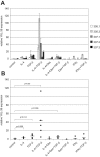Expression of Osteoarthritis Marker YKL-39 is Stimulated by Transforming Growth Factor Beta (TGF-beta) and IL-4 in Differentiating Macrophages
- PMID: 19578492
- PMCID: PMC2688341
Expression of Osteoarthritis Marker YKL-39 is Stimulated by Transforming Growth Factor Beta (TGF-beta) and IL-4 in Differentiating Macrophages
Abstract
YKL-39 is a Glyco_18 domain containing chitinase-like protein which is currently recognized as a biomarker for the activation of chondrocytes and the progress of the osteoarthritis in human. YKL-39 was identified as an abundantly secreted protein in primary culture of human articular chondrocytes. Two biological activities of YKL-39 might contribute to the disease progression. One is the induction of autoimmune response and second is the participation in tissue remodeling. Other mammalian chitinase-like proteins including chitotriosidase, SI-CLP, YKL-40 and YM1 are expressed by macrophages in various pathological conditions. In contrast, YKL-39 was never reported to be produced by macrophages. We used in vitro model of human monocyte-derived macrophage differentiation to analyse regulation of YKL-39 expression. Expression of YKL-39 was examined by real-time RT-PCR. CD14+ MACS sorted human monocytes differentiated for 6 days under different stimulations including IFNgamma, IL-4, dexamethasone and TGF-beta. We found that both IL-4 and TGF-beta have weak stimulatory effect on YKL-39 expression in all donors tested (3.2 +/- 1.7 fold, p = 0.006 and 6.3 +/- 3.1 fold, p = 0.014 respectively). However the combination of IL-4 and TGF-beta had strong stimulatory effect on the expression of YKL-39 in all analysed individual macrophage cultures (34 +/- 36 fold, p = 0.05). IFN-gamma did not show statistically significant effect of YKL-39 mRNA expression. Presence of dexamethasone almost completely abolished the stimulatory effects of IL-4 and TGF-beta. In summary, we show here for the first time, that human cells of monocyte origin are able to produce YKL-39. Maturation of monocyte derived macrophages in the presence of Th2 cytokine IL-4 and TGF-beta leads to the strong activation of YKL-39 expression. Thus elevated levels of YKL-39 observed during chronic inflammations can not be attributed solely to the activity of chondrocytes. In perspective, YKL-39 might serve as a useful biomarker to detect macrophage-specific response in pathologies like tumour, atherosclerosis and Alzheimer disease.
Figures

Similar articles
-
Human chitinases and chitinase-like proteins as indicators for inflammation and cancer.Biomark Insights. 2007 May 3;2:128-46. Biomark Insights. 2007. PMID: 19662198 Free PMC article.
-
Novel stabilin-1 interacting chitinase-like protein (SI-CLP) is up-regulated in alternatively activated macrophages and secreted via lysosomal pathway.Blood. 2006 Apr 15;107(8):3221-8. doi: 10.1182/blood-2005-07-2843. Epub 2005 Dec 15. Blood. 2006. PMID: 16357325
-
Regulation of YKL-40 expression by corticosteroids: effect on pro-inflammatory macrophages in vitro and its modulation in COPD in vivo.Respir Res. 2015 Dec 22;16:154. doi: 10.1186/s12931-015-0314-3. Respir Res. 2015. PMID: 26696093 Free PMC article. Clinical Trial.
-
Modulation of macrophage function by transforming growth factor beta, interleukin-4, and interleukin-10.Ann N Y Acad Sci. 1993 Jun 23;685:713-39. doi: 10.1111/j.1749-6632.1993.tb35934.x. Ann N Y Acad Sci. 1993. PMID: 8363277 Review.
-
Cooperation of liver cells in health and disease.Adv Anat Embryol Cell Biol. 2001;161:III-XIII, 1-151. doi: 10.1007/978-3-642-56553-3. Adv Anat Embryol Cell Biol. 2001. PMID: 11729749 Review.
Cited by
-
Perspectives for Monocyte/Macrophage-Based Diagnostics of Chronic Inflammation.Transfus Med Hemother. 2016 Mar;43(2):66-77. doi: 10.1159/000444943. Epub 2016 Mar 15. Transfus Med Hemother. 2016. PMID: 27226789 Free PMC article. Review.
-
Tumor-associated macrophages in human breast cancer produce new monocyte attracting and pro-angiogenic factor YKL-39 indicative for increased metastasis after neoadjuvant chemotherapy.Oncoimmunology. 2018 Mar 13;7(6):e1436922. doi: 10.1080/2162402X.2018.1436922. eCollection 2018. Oncoimmunology. 2018. PMID: 29872578 Free PMC article.
-
Atherosclerosis is exacerbated by chitinase-3-like-1 in amyloid precursor protein transgenic mice.Theranostics. 2018 Jan 1;8(3):749-766. doi: 10.7150/thno.20183. eCollection 2018. Theranostics. 2018. PMID: 29344304 Free PMC article.
-
Potential Roles and Future Perspectives of Chitinase 3-like 1 in Macrophage Polarization and the Development of Diseases.Int J Mol Sci. 2023 Nov 9;24(22):16149. doi: 10.3390/ijms242216149. Int J Mol Sci. 2023. PMID: 38003338 Free PMC article. Review.
-
Human cartilage chitinase 3-like protein 2: cloning, expression, and production of polyclonal and monoclonal antibodies for osteoarthritis detection and identification of potential binding partners.Monoclon Antib Immunodiagn Immunother. 2013 Oct;32(5):317-25. doi: 10.1089/mab.2013.0016. Monoclon Antib Immunodiagn Immunother. 2013. PMID: 24111862 Free PMC article.
References
-
- Aerts JM, Hollak CE, van Breemen M, et al. Identification and use of biomarkers in Gaucher disease and other lysosomal storage diseases. . Acta. Paediatr. Suppl. 2005;94:43–6. - PubMed
-
- Bierie B, Moses HL. Tumour microenvironment: TGFbeta: the molecular Jekyll and Hyde of cancer. Nat. Rev. Cancer. 2006;6:506–20. - PubMed
-
- Boot RG, van Achterberg TA, van Aken BE, et al. Strong induction of members of the chitinase family of proteins in atherosclerosis: chitotriosidase and human cartilage gp–39 expressed in lesion macrophages. . Arterioscler. Thromb. Vasc. Biol. 1999;19:687–94. - PubMed
-
- Boven LA, van Meurs M, Boot RG, et al. Gaucher cells demonstrate a distinct macrophage phenotype and resemble alternatively activated macrophages. . Am. J. Clin. Pathol. 2004;122:359–69. - PubMed
LinkOut - more resources
Full Text Sources
Research Materials
Miscellaneous
